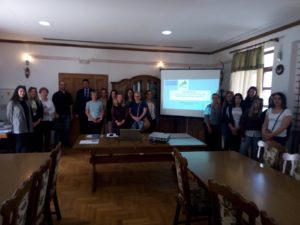How will work evolve in remote areas?
On Friday 27th May, in the premises of the Cultural Center Skrad,the new project of the Local Development Agency PINS “Go Remote” was presented. Montana174 participates to the event.
COVID-19 impact on youth and employment in remote areas
During the year 2020, COVID-19 crisis affected employment in two significant ways. On the one hand, unemployment rose sharply and the most significant percentage increase was recorded across young generations. On the other hand, teleworking has become the new norm. The merging of these two effects resulted in the “Go remote” project. On 27th May, this project was presented by Ms. Dubravka Kolarić Zatezalo, President of the Board of the Local Development Agency PINS.
Go Remote reduces youth employment
“Go Remote” aims to reduce youth unemployment in rural areas by educating people between 20 and 29 years old to work remotely. In particular, this project seeks to increase the quality and number of remote job opportunities, making remote jobs available not only to the upper class, but also to those most in need – young people from less developed areas, facing demographic, social and economic barriers.
To achieve this, “Go Remote” will help to identify the profiles of remote workers across different countries (Bulgaria, Croatia, Cyprus and Latvia) and the most appropriate skills to do these jobs. Therefore, the project will define the most appropriate methods and approaches for training NEET youth on these skills.
The project was supported by the Head of the Unified Administrative Department of the Municipality of Skrad, Mr. Marko Moguš, head coach of the Go Remote project, Mr. Milan Vukelić, representative of the Ministry of Science and Education and young entrepreneurs Antonija Podobnik and Lana Renka.
More ways to support youth and employment in remote areas
At the end of event, Ms. Josipa Liker from the Local Development Agency PINS presented the outputs of Montana174 to youth and employment, such as the video testimonials and some examples of projects funded by Cohesion Policy to support youth and job opportunities in mountain areas. She also introduced the participants to the new financial perspective 2021-2027 and the many opportunities it offers.











